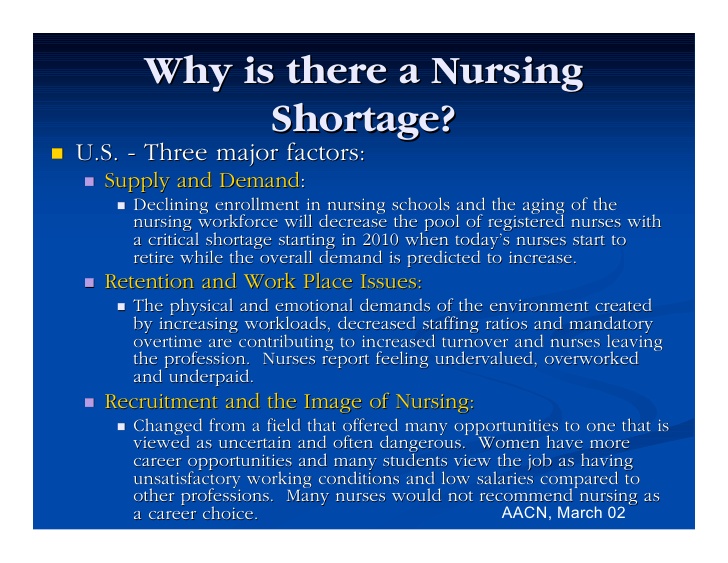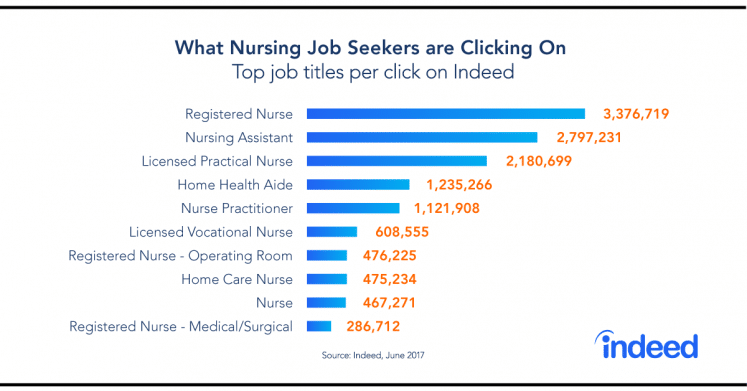
US Nursing Shortage and Healthcare impact: With people living longer lives, new strains, demands and opportunities are being created- but how is the industry faring?
For as long as we shall live, we will need nurses. Healthcare professionals can never be replaced by machinery and we need those special people who can fulfill a role that not just anybody can do. As the population is ever growing and we are living to be far older, the demands on the healthcare system have become larger and larger. Alongside this, fewer people are choosing the nursing profession due to long hours and the stress it can bring.
Nursing is certainly a high demand profession, so those that study for this degree are guaranteed to get a job, which makes this a good thing for any current nursing students. 72% of Chief Nursing Officers said they are experiencing a moderate shortage of nursing staff at least, with many reporting a much more than moderate shortage. Only 7% of these nurses spoke out and said they are not experiencing a shortage at all. So, what does it all mean? Here we investigate what the US nursing shortage means for healthcare, nurses, and the general public.
What Effect Will the Nursing Shortage Have on Healthcare?
The lack of nurses has a great effect on the healthcare system and means patients cannot be cared for as well as healthcare professionals would like. This also means that hospitals are stretched for staff and can look after fewer patients. Taking on too many patients without the appropriate number of nurses is unsafe and could cause an accident or even be fatal. Nurses that are in their current role are feeling the demands and this can cause a significant amount of stress. Nurses already work long hours through the day and night, so adding more patients to care for into this mix is asking for disaster.
The nursing shortage can lead to low morale, as those who are on shift must work twice as hard to cover staff that are missing. This also means those in lower paid roles are taking on more than they should be and are not being paid any extra for it. The shortage is also causing nurses to leave the profession due to stress and not being paid enough to have such high demand placed on them. That being said, the healthcare system cannot afford to pay nurses much more, but something must be done to stop the shortage if we want a safe healthcare system in the US.
The Chief Nursing Officers blamed nursing shortages for poor patient care and said that these shortages have caused a considerable impact on patient satisfaction. As nurses are stretched, they cannot answer buzzers fast enough and medications can be delayed, which all impacts on the patient. Nurses cannot spend the time they need to or want to with their patients. Nurses are meant to be at the forefront of a patient’s care, providing them with emotional support and comfort. Due to the nursing shortages, this time is not being spent with patients, meaning therapeutic relationships cannot be formed. Without this, patients in hospitals can feel much lonelier and not build the trust needed between a nurse and a patient.
Further research has been carried out which further links the nursing shortage with negative patient experience and poor patient care. This means that nurses are going to have a bad reputation, even if they are doing all they can for all the patients they are caring for. With nurses looking after more patients than they should, mortality rates are rising, and failure-to-rescue rates are also increasing compared to those patients looked after by a nurse with a fewer number of patients. Hospitals are also negatively impacted by these nursing shortages. With fewer nurses, the amount hospitals must spend on labor increases. This means less money can be spent on patient care and improving these facilities.
Hospitals are having to offer more money to nurses to coax them in, with offers such as sign-on bonuses. If a hospital does not have enough nursing staff, they can outreach to other hospitals or to nursing agencies. These nurses can then work in the hospital, but for much more money than a nurse that is already hired at the hospital.
Furthermore, these nurses have more than likely never worked at the hospital before, meaning they will not know their way around the wards or how they work, causing further issues. Patients thrive from continuing care and so a nursing shortage means a different nurse on every shift so patient and nurse relationships cannot be formed.

What Are the Main Causes of The Nursing Shortage?
The nursing shortage has been caused by many factors, some of which can be helped and some which cannot. The aging population is one of the biggest reasons for the nursing shortage. As we live longer, health complications which would once kill us can be treated. This means many more people are in hospital for treatments and those who are older are much more susceptible to illness, as well as falls and mental health problems. Right now, in the US, the over 65 population is larger than it has ever been in history.
Another cause of the nursing shortage is the limited number of nursing students. Nursing schools are noticing a decrease in the number of people applying and studying for a degree. A nursing degree can be very difficult and includes a lot of time working on the wards. For those with other things going on in their lives, this degree can be a lot more time constricting than other degrees. Another cause of this is the tuition fees, as many people are choosing to not attend university, so they are not left in debt.
Another shortage within the nursing profession is the lack of men. Many women go on to have children and are usually the main caregiver. This means even though many women work full-time, the nursing shortage will only grow larger when they go on to maternity leave to have children. It is also estimated that the nursing shortage will worsen when nurses begin to retire in the next 10-15 years. Whilst many nurses are leaving the profession, it is thought that this is now leveling off.

Why Choose a Degree in Nursing?
If you think you have what it takes to be a nurse, there has never been a better time to look into what does a clinical nurse specialist do and get into the healthcare industry. With this shortage, hospitals are crying out for those with a nursing degree and are often offering great bonuses for staff. As well as this, there are plenty of chances for overtime if you don’t have any commitments. This makes nursing a great job, especially for the younger generation who do not yet have a family. That being said, having a family shouldn’t stop you from choosing a career in nursing, as those with children can be that much more empathetic.
Whilst it may sound off-putting with the amount of stress, the more people that choose this career, the less stress will be put on the nurse population. Healthcare industries are doing everything they can to minimize the stress on nurses and offer a lot of mental and emotional support.
If you do want to study a nursing degree, there are many degrees out there. Many people who already have a degree in nursing are also looking at studying for a further degree to the bridge the gap between nurses and doctors. It is not just nurses that are feeling the pinch in the healthcare industry; there are also fewer doctors and other healthcare professionals.
If you already have a nursing degree, why not further your career for a chance to make more money and increase your knowledge? Baylor University offers many programs to those with a nursing degree, including a Family Nurse Practitioner Program and an Executive Nurse Leadership Program.
If you want to be a role model for future nurses and ensure that we attract more hardworking and kind people to this role, choosing to advance your own knowledge and skills means that you can teach and lead other newly qualified nurses.
The nursing shortage within the US is growing but we can do something about it. Hospitals and other healthcare industries are already doing a lot to recruit nurses, including cash incentives just for signing up. The US population need to know about this shortage, as this means they will be more aware when they do go into hospital why they may not be receiving the care they had hoped for.
Nurses are doing all they can for their patients, but it is a highly stressful job and we need more nurses to reduce this stress and ensure that nurses get the time they need with each patient. If you think you have what it takes to be a nurse, why not study for a nursing degree? It takes a special person to become a nurse, so if you do have the willpower and determination to do so, it can bring with it a rewarding career.






